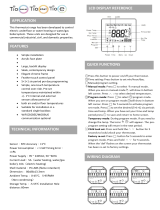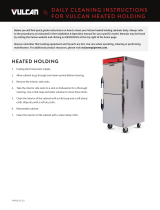
– 16 –
Always Set the Temperature Before Setting the Time
• Press the SET button. Press the TEMPERATURE button;
StPt
displays. Use the Up and Down Arrow
keys to increase or decrease the Temperature. To save, press the SET button again.
At startup, the display will initially show a
GROWING
BAR
. When the oven temperature reaches the Set Point,
the set temperature displays. The READY light is lit, the HEAT light goes out, and the oven is ready for
you to select the Cook Time, Menu Item Cook Time, or Menu / Rack # Cook Time.
Starting a Timed Cycle On All Racks
• Open the door,
door
will display.
• Place the desired product on any of the five racks.
• Close the door. The display should return to the set temperature or the
GROWING
BAR
.
• Press the Menu Key once for Primary or twice for Secondary to select a Menu Item Cook Time.
• Press the START / STOP button *.
• The timer will count down the time remaining for the Menu Item Cook Time.
• When the time has counted down to 00:00, the buzzer will sound and all Rack Buttons will flash.
• To silence the buzzer, press the START / STOP button.
*
Pressing the START / STOP button after making a menu selection will time all racks for the selected
menu time.
Starting a Timed Cycle Using Programmed Individual Menu / Rack # Cook Time(s)
• After the set Temperature is reached, open the door;
door
displays. Place product(s) in oven.
• Close the door. The display returns to the set Temperature or the
GROWING
BAR
.
• Select the Menu Item (once for Primary or twice for Secondary) and the Rack # to select the
Menu / Rack # Cook Time. If using simultaneous cook times, select the other Menu / Rack #'s.
• The timer selects the Rack # with the shortest Cook Time and counts down to 00:00.
• The buzzer sounds and the Rack # flashes. To silence the buzzer, press the flashing Rack #.
• Open the door;
door
displays; remove the finished product; close the door.
✣ The next shortest Cook Time displays, its Rack # flashes and the time counts down to 00:00.
• The buzzer sounds. Press the flashing Rack #. Open the door,
door
displays. Remove the product,
close the door. Repeat from ✣ until all Rack #'s are done.
To Display the Actual Oven Temperature
• Press and hold the Temperature button for 3 seconds to display Actual Oven Temp until released.
To End a Cooking Cycle
At the end of a cooking cycle, the alarm will sound. To silence the alarm and end a Menu Item cooking cycle,
press START / STOP. To silence the alarm and end a Rack # cooking cycle, press the Rack #.
To cancel a cooking cycle which might have been started in error, press and hold the Rack button to be
terminated and press START / STOP at the same time.
Door and Timing
Opening the door while loading additional product will interrupt all timing functions until the door is closed
and the timer resumes. For example, if a product time had diminished to 1 minute and the door was opened
for 30 seconds and then closed, the timer would still show 1 minute.
SETTING THE OVEN FOR ROAST & HOLD
• Press the Roast & Hold button to select Roast & Hold.
• Set the first stage Temperature and the Cook Time as described in: M
ANUALLY SETTING THE
TEMPERATURE AND COOK TIME. Press START / STOP to begin cooking.
*
The HOLD Temperature is preset by the computer control at 150°F (66°C).





















